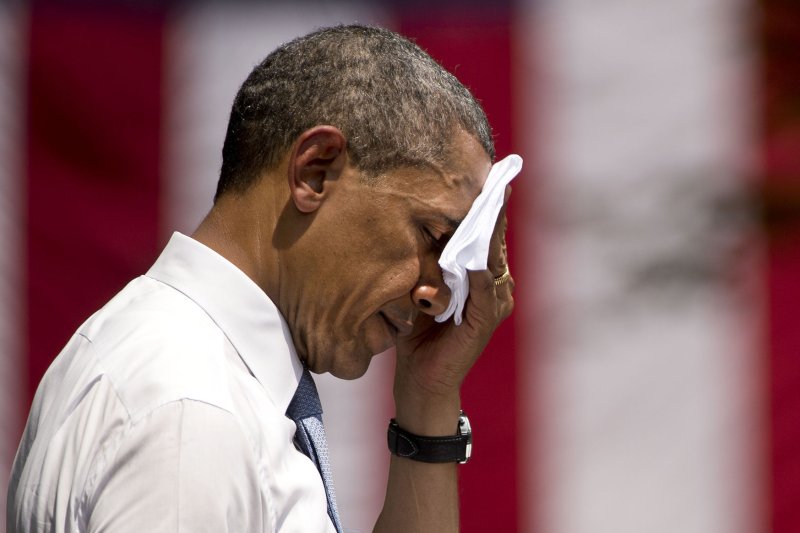President Barack Obama wipes sweat from his face as he delivers remarks on climate change and new environmental standards, on the campus of Georgetown University on June 25, 2013 in Washington, D.C. UPI/Kevin Dietsch |
License Photo
According to the World Meteorological Organization, last year was the sixth warmest year ever recorded.
Every year, WMO issues its Status of the Climate report, this year's report described warming trends as well as the rise of extreme weather events across the globe.
The 21st century -- still in its infancy -- is already home to 13 of the 14 hottest years in history. The first 10 years of the new millennium, from 2001 to 2010, was the warmest decade on record.
Climate scientists continue to stipulate that year-to-year temperature variances, or even extreme weather events, can't be directly linked to global warming. But climatologists agree that the WMO reports are evidence of the continuation of a long-term trend.
“Since 2001, the first year of this Century, the coldest year that we have observed since 2001 is actually warmer than any year before 1998," WMO Secretary-General Michel Jarraud said in a press release. "I do not think this can be used in seeing a contradiction of the stop in climate change. Climate change is not stopping."
The WMO report also details other climate factors linked with the warming planet, including loss of sea ice cover at both poles, warming ocean temperatures, rising sea levels, and record-high concentrations of CO2 and other greenhouse gases.
Even though Jarraud acknowledged that a single extreme weather event, like Superstorm Sandy, can't be blamed on global warming, he said the the uptick of weather phenomena around the globe -- like extended downpours, longer droughts, stifling heat, flooding, and more powerful storm surges -- are all consistent with the global warming consequences climate scientists have long predicted.
"While the challenges facing the next generations are enormous, the opportunities for addressing them have never been greater," Jarraud said.
The WMO, based in Geneva, Switzerland, is an affiliate of the United Nations that focuses on weather, climate and water issues. The UN is hosting a conference on climate change this fall in Lima, Peru, and a larger conference in Paris next year.
[Voice of America]
[Scientific American]















